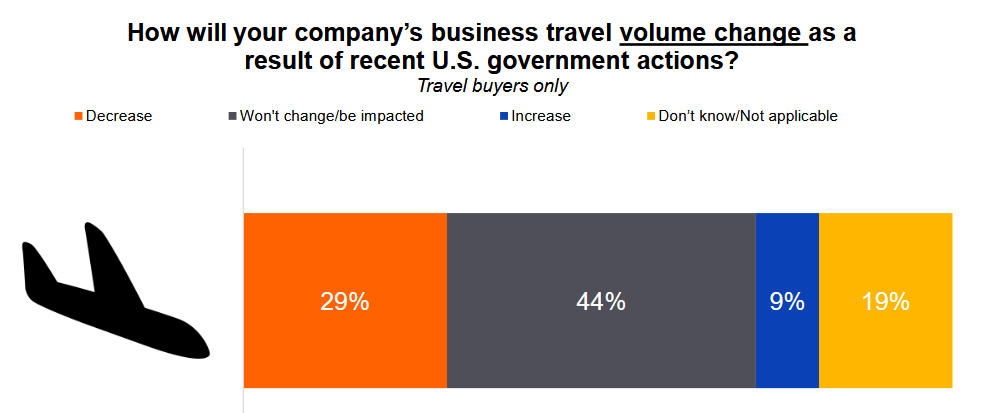
Nearly a third of global travel buyers predict sharp drop in business trips for 2025 amid political headwinds

New data suggests growing unease among global travel professionals, as shifting U.S. policies cast a shadow over business travel expectations for the year ahead.
According to a poll of over 900 global respondents, nearly one in three travel buyers expect a major downturn in business trip volumes in 2025, driven largely by geopolitical and regulatory disruptions originating from the U.S.
“While the outlook for global business travel was incredibly strong coming into 2025, our research now shows increasing concerns and uncertainty within our industry, considering recent actions taken by the US government,” said Suzanne Neufang, CEO of the Global Business Travel Association (GBTA).
“Traveling for work plays a vital role in supporting business growth, resilient economies, strong diplomatic ties and valuable connections.”
The poll—conducted from March 31 to April 8—asked industry professionals about the ripple effects of various U.S. initiatives, including new tariffs, entry restrictions, travel advisories, and increased detainment risks.
These measures appear to be significantly altering global sentiment: only 44% of corporate travel buyers believe their companies will avoid an impact on 2025 travel volume, while just a quarter of travel suppliers hold a similar view regarding revenue.
Meanwhile, 29% of travel buyers foresee a drop in corporate travel volume next year, with average cuts pegged at 21%. Nearly one in five buyers said they're still unsure about the full effect, highlighting the growing ambiguity in travel planning, found the GBTA survey of travel professionals across 45 countries and multiple regions—including North America, Europe, Asia-Pacific, Latin America, Africa, and the Middle East.
In line with this, 27% of buyers also anticipate a spending reduction of 20% or more—potentially shaving up to $88 billion off the projected $1.63 trillion in global business travel spend for 2025.
On the supply side, 37% of providers and travel management firms forecast an average 18% decline in revenue, showing that the repercussions extend beyond traveler sentiment to the entire travel supply chain.
Perhaps the most striking shift is in industry morale. Just 31% of global travel professionals reported feeling optimistic about the year ahead—down dramatically from 67% in GBTA’s November 2024 poll. The share of neutral respondents rose to 40%, reflecting a growing trend toward cautious pragmatism.
“Productive and essential business travel is threatened in times of economic uncertainty or in an environment of additional barriers and restrictions,” added Neufang. “This undermines economic prosperity and damages the many sectors that rely on global business travel to survive and thrive.”
Neufang pointed to two trends to monitor closely: prolonged financial pressure on organizational travel budgets and further tightening of cross-border mobility rules, both of which could extend or deepen the downturn.
GBTA’s survey results indicate real-time impacts, especially for travel linked to the United States. Since the start of 2025:
Interestingly, firms based outside the U.S. are three times more likely to move meetings or events to alternate locations. In total, 14% of companies have already done so or are planning to.
Top concerns surrounding the long-term fallout include:
Safety and employee willingness to travel to the U.S. also featured prominently, both cited by 37% of respondents, found the GBTA.
Adding a personal dimension to the findings, 23% of respondents said they know someone whose travel plans were directly impacted by the recent changes to U.S. policy.